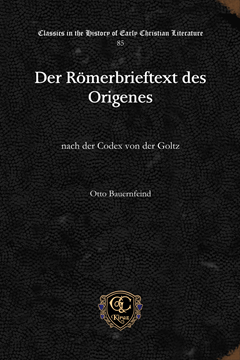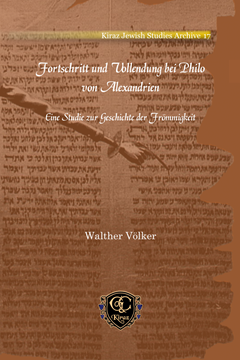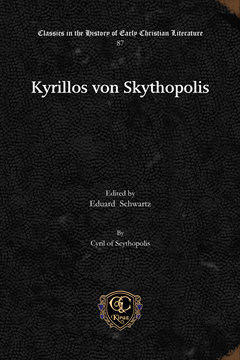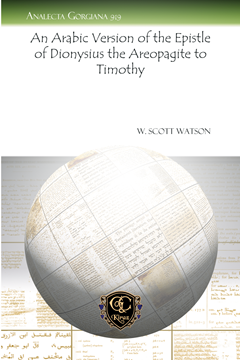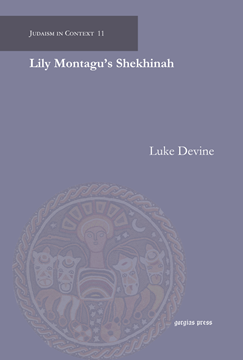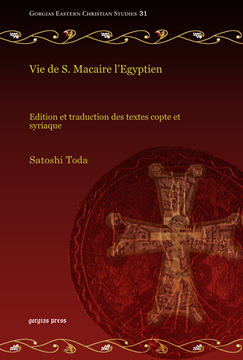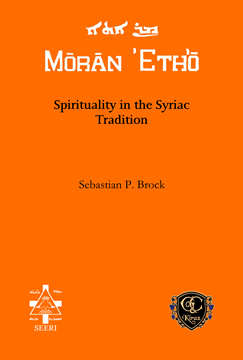Der Römerbrieftext des Origenes
nach der Codex von der Goltz
ISBN: 978-1-61143-517-7
This text is a variant of Paul's Epistle to the Romans.
$60.00 (USD) $36.00 (USD)
Fortschritt und Vollendung bei Philo von Alexandrien
Eine Studie zur Geschichte der Frömmigkeit
Series: Kiraz Jewish Studies Archive 17
ISBN: 978-1-61143-520-7
This work details the life of Alexandrian Jewish philosopher Philo and his guidance on the conduct of the spiritual life, with an introduction surveying the life and works of Philo and the critical writing on his philosophy.
$118.00 (USD) $70.80 (USD)
Kyrillos von Skythopolis
Edited by Eduard Schwartz; By Cyril of Scythopolis
ISBN: 978-1-61143-521-4
This work details the lives of seven Palestinian monks and abbots, written in popular Greek by Cyril of Scythopolis, a sixth-century monk.
$131.00 (USD) $78.60 (USD)
An Arabic Version of the Epistle of Dionysius the Areopagite to Timothy
Series: Analecta Gorgiana 919
ISBN: 978-1-61143-530-6
The letter that claims to be addressed by Dionysius the Areopagite to Timothy upon the martyrdom of Peter and Paul is not included among the epistles. It was composed originally in Greek, but it is exhibited in Arabic.
$34.00 (USD) $20.40 (USD)
Critical Reviews in the History of Science (Volume 4)
Edited by Alan C. Bowen & Tracey E. Rihll
Series: Aestimatio 4
ISBN: 978-1-61143-547-4
Aestimatio provides critical, timely assessments of books published in the history of what was called science from antiquity to the early modern period in cultures ranging from Spain to India, and from Africa to northern Europe. The aim is to allow reviewers the opportunity to engage critically both the results of research in the history of science and how these results are obtained.
$142.00 (USD) $85.20 (USD)
Critical Reviews in the History of Science (Volume 5)
Edited by Alan C. Bowen & Tracey E. Rihll
Series: Aestimatio 5
ISBN: 978-1-61143-549-8
Aestimatio provides critical, timely assessments of books published in the history of what was called science from antiquity to the early modern period in cultures ranging from Spain to India, and from Africa to northern Europe. The aim is to allow reviewers the opportunity to engage critically both the results of research in the history of science and how these results are obtained.
$149.00 (USD) $89.40 (USD)
Lily Montagu’s Shekhinah
By Luke Devine
Series: Judaism in Context 11
ISBN: 978-1-61143-684-6
Lily Montagu’s Shekhinah outlines Lily Montagu’s theological writing, particularly her appropriation of the feminine aspect of the divine presence, Shekhinah, and provides a much needed corrective to the androcentric Anglo-Jewish historiography that has ignored, marginalized, and completely erased the founder of the Liberal Jewish movement in England. Luke Devine’s book is vital reading for students of Anglo-Jewry, First-Wave feminism, Jewish feminism, Liberal Judaism, and Jewish mysticism.
$169.00 (USD) $101.40 (USD)
Critical Reviews in the History of Science (Volume 6)
Edited by Alan C. Bowen & Tracey E. Rihll
Series: Aestimatio 6
ISBN: 978-1-61143-555-9
Aestimatio provides critical, timely assessments of books published in the history of what was called science from antiquity to the early modern period in cultures ranging from Spain to India, and from Africa to northern Europe. The aim is to allow reviewers the opportunity to engage critically both the results of research in the history of science and how these results are obtained.
$143.00 (USD) $85.80 (USD)
Vie de S. Macaire l’Egyptien
Edition et traduction des textes copte et syriaque
By Satoshi Toda
Series: Gorgias Eastern Christian Studies 31
ISBN: 978-1-61143-971-7
Saint Macarius the Egyptian’s (c. 300–390) virtue and spiritual exploits gave rise to various tales and sayings. These were recounted, some hundred years later, in hagiographical form, and were then disseminated in various languages of the Christian Orient, including Coptic, Syriac, Arabic, Ethiopic, Greek, and Georgian. This book presents a rare study of a text, taking into account its transmission in multiple languages, accompanied by newly re-edited Coptic and Syriac versions of the Life. This book also provides a commentary on the life of the “historical Macarius”, as well as the Life seen as a literary, hagiographical, work.
$270.00 (USD) $162.00 (USD)
Spirituality in the Syriac Tradition
Series: Moran Etho
ISBN: 978-1-61143-558-0
In the present volume, Sebastian Brock provides an introduction and overview of the unique themes and features of spirituality in the Syriac tradition and includes excerpts from various texts throughout the Syriac tradition that exhibit these features.
$162.00 (USD) $97.20 (USD)
